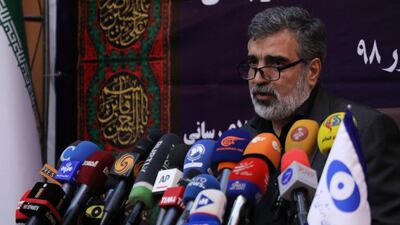Iran on Saturday said it is injecting uranium gas into advanced centrifuges in a further breach of the 2015 nuclear deal agreed with world powers.
“Europeans should know that there is not much time left” to save the 2015 Joint Comprehensive Plan of Action, an agreement on the Iranian nuclear programme, said Behrouz Kamalvandi, spokesman for Iran's Atomic Energy Organisation.
He also claimed that Iran has the ability to go beyond 20 per cent uranium enrichment, which analysts say is a short technical step from reaching 90 per cent, or weapons-grade, enrichment.
Mr Kamalvandi said that Iran will, however, continue to allow United Nations inspectors to access nuclear sites in the country.
Iran already has gone beyond the stockpile and enrichment level limits set by the nuclear deal.
The breaches are intended to raise pressure on the European signatories – France, Germany and Britain – to find effective ways around choking US economic sanctions imposed on Tehran since President Donald Trump pulled out of the pact last year.
France has floated a proposed $15 billion line of credit to allow Iran to sell its oil abroad despite US sanctions. Another trade mechanism proposed by Europe called Instex also faces difficulty.
Mr Kamalvandi said Iran had begun using an array of 20 IR-6 centrifuges and another 20 of IR-4 centrifuges. An IR-6 can produce enriched uranium 10 times as fast as an IR-1, Iranian officials say, while an IR-4 produces five times as fast.
The advanced centrifuges would further reduce the one year that experts estimate Tehran would need to have enough material for building a nuclear weapon if it chose to pursue one.
The European Union last week demanded that Iran return to its commitments under the nuclear deal after Mr Kamalvandi announced that Tehran be would ending limits on its atomic research.
On Sunday the acting chief of the International Atomic Energy Agency (IAEA), Cornel Feruta, is due to hold talks with Iranian officials in Tehran.
"The visit is part of ongoing interactions between the IAEA and Iran," the agency's spokesman said.
The visit comes ahead of the IAEA’s quarterly meeting next week.
On Saturday the US Defence Secretary Mark Esper condemned Iran's latest breach, telling reporters in Paris that the move should not surprise anyone.
“It’s no surprise that the Iranians are going to pursue what the Iranians have always intended to pursue," he said.
Iran denies Washington’s accusations that it seeks to develop a nuclear bomb, insisting its programme is for peaceful purposes.
US Secretary of State Mike Pompeo on Friday urged European nations to stop Iran's "extortion".
"We are confident that the UK, France and Germany – indeed, all civilised nations – will take decisive actions to stop Iran's nuclear extortion," Mr Pompeo, who visited the European Union headquarters in Brussels earlier in the week, wrote on Twitter.
Mr Pompeo also accused Iran of seeking to build "their nuclear weapons systems."
"Those things are unacceptable," Mr Pompeo said in an interview with a local radio station visiting his home state of Kansas.
Despite his administration's hawkish stance, Mr Trump has said he is willing to speak with Iran, a prospect proposed by France.
"For months now President Trump has said that he'd be happy to meet with Iranian leadership with no preconditions. But our outcome from those conversations is also unambiguous," Mr Pompeo.
Iran insists that it will not negotiate under pressure.
Adding to months of fraught tensions between the two states, the oil tanker Grace 1 — which has been renamed Adrian Darya 1 — appears to be at the Syrian port of Tartus after turning its tracker off days ago.
US national security adviser John Bolton shared a satellite photograph on Saturday showing the tanker only two nautical miles from the deepwater port.
He called on the IAEA to urgently submit a full report on Iran as soon as possible.
The ship was previously taken into custody by UK commandos near Gibraltar on suspicion of taking oil to Syria against European Union sanctions, which Iran denied.
After its release last month, the US issued a warrant for the ship to be seized, saying it was part of a network of vessels being operated by Iran’s Revolutionary Guards, which the US considers to be a terrorist organisation, to supply oil to the Syrian regime.
Mr Esper previously said that Iran posed a "rampant" threat to the Middle East by supporting and inspiring militia forces that are waging hostile attacks on countries across the region.
Speaking in support of Washington's policy of "maximum pressure" on the Iranian regime to reign in its allies and militia forces, Mr Esper used an appearance in London on Friday to condemn the "bigger challenge" that Iran posed to regional security.
"Iran is rampant in terms of its militias malign behaviour throughout the region and they are undermining any number of governments," he told an invited audience at the Royal United Services Institute. "In many cases, Iran is supporting, inspiring many of those forces in the region.
"Iran is supporting the Houthi rebels and the Houthi rebels are everyday shooting missiles north," he added. "They are funding militias in Iraq and into Syria and all the way across into Lebanon."

